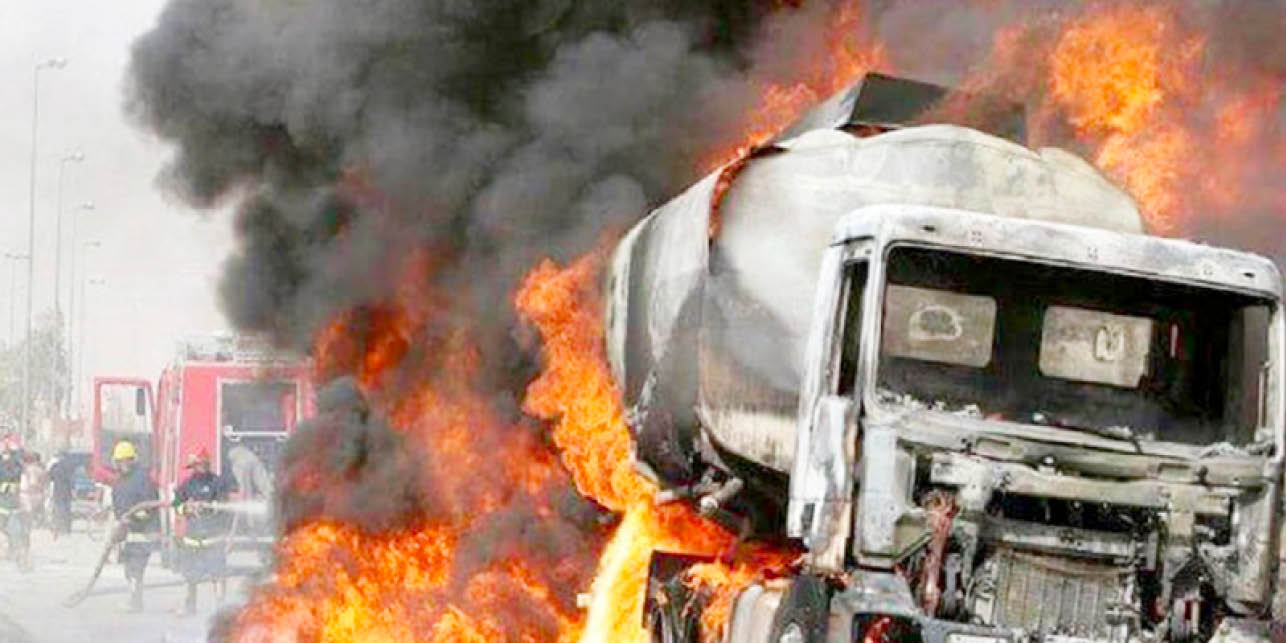From 2020 till date, no fewer than 309 people have died in different tanker fires across the country, while 310 others were injured, checks by Daily Trust Saturday have shown.
Abdullateef Aliyu, Lagos, Mumini Abdulkareem, Ilorin & Tijani Labaran, Lokoja
The figures were gathered from various incidents involving tanker trucks across the country from 2020 to 2023, with 2022 recording the highest fatalities.
A breakdown of the figure showed that 97 people lost their lives in 2020, 79 people died in various incidents in 2021 and 35 people have so far died in various tanker accidents in 2023.
Similarly, 112 people were injured in 2020, 128 in 2021, 30 in 2022 and 40 in 2023. Several properties, including vehicles, were also lost to various explosions that occurred in many parts of the country, including Lagos, Ogun, Kwara, Kogi, Niger, Oyo, Delta, Anambra, Imo, Rivers, Abuja, Plateau.
FG targets 1million jobs through export programme
FG releases 150 inmates in Kano, 182 in Gombe
Featuring prominently in the figure is the Lagos-Ibadan expressway, which has recorded several explosions in recent times, destroying dozens of vehicles and other properties.
On November 7, 2020, 29 vehicles were burnt when a tanker exploded at Kara bridge. Two people died and 10 other victims were injured.
The Jebba-Olowu-Mokwa axis in Kwara and Niger states is also notorious for several tanker accidents, which have rendered many residents homeless.
In December 2020, six people died while 30 buildings were razed in a tanker explosion in Jebba town.
In Lambatta town in Niger State, 47 shops, four houses and two motorcycles were burnt, while two people died in a tanker explosion in the village.
In 2021, one of the major explosions involving tankers was the incident that happened at Oshigbudu-Obagaji junction, Agatu Local Government Area of Benue State, which killed 13 people while over 50 houses were burnt.
The same year in January, an incident was recorded at IBB Boulevard in Abeokuta, Ogun State, killing seven people while six others were injured, in addition to seven cars and six motorcycles that were burnt.
In 2022, one of the most fatal incidents recorded was along the Sagamu interchange on the Lagos-Ibadan expressway, where six people died and four vehicles were burnt. More fatal was the incident in Kogi, where 12 people died while 12 cars, a tanker, a truck and six motorcycles were burnt.
In the last 10 months of 2023, no fewer than 40 people have died as a result of different tanker explosions across the country.
Again, the Ilorin-Jebba road in Moro Local Government Area of Kwara State also featured prominently when an incident which occurred on October 21 left seven people dead. Also, in 2023, an incident that happened at Koko junction, Ologbo bridge, along Benin/Warri in Delta State on October 1, 2023, also claimed seven lives while 15 vehicles were burnt.
Also, on October 9, six people died in another tanker explosion at Sandali Filling Station in Lafia Nasarawa State, while properties worth millions of naira were lost.
In virtually all the incidents, lives were involved and properties worth billions of naira lost.
This has raised concerns about the safety of tankers plying the highways despite the presence of the appropriate agencies of the government, especially the Federal Road Safety Corps (FRSC).
During a recent incident in Kwara State, a father who lost two children, in a chat with our correspondent, said life had never been the same for him, describing the incident as devastating.
He said, “Among the over 15 victims of the fire, only one is still battling for life in the hospital. The rest have died, including my two children, who were 8 and 13 years of age.
“We heard that the cause of the last incident was brake failure, during which the inexperienced driver decided to slam it on a gutter and fire was ignited. It caught my two children who went to fetch water there.
“Most experienced drivers usually horn consistently to alert residents of the danger at hand, but this was not the case. Many of those killed were caught unawares.”
He said Jebba expressway was surrounded by houses and several neighbourhoods, a situation that puts residents at the receiving end of accidents, which variously led to a number of deaths.
He added that the expressway is sloppy and most truck and tanker drivers are inexperienced, and they don’t observe speed limits, a situation that has been worsened by lack of speed breakers.
Okunrinlolohun therefore advocated the provision of enough speed breakers to control the speed of drivers because of the peculiarity of the expressway and its location.
“Also, functional health centres should be provided in the rural areas to help treat victims of such incidents,” he added.
Another resident of Moro, Alfa Suleiman Jamiu, said the incidents had become rampant along the Ilorin-Jebba-Olooru axis, and called for the establishment of a fire service point for quick response.
“The only solution is to have a fire point around there. We have many towns and villages along the expressway in Ilorin-Jebba-Oloru and this has always been the case. Any time it happens, lives and properties are lost. I have lost count of the number of people that died and properties destroyed. We hope the government would help us to do the needful by being proactive in addressing this.
“I went to visit one of the victims of the recent incident with the two House of Assembly members representing Moro and it was very traumatising,” he said.
In one of the many incidents in Kogi State, victims are yet to recover from losses suffered as a result of frequent explosions.
One of those incidents involving over 30 shops, several items on sale, including phones and accessories, textile materials, shoes, drinks, second-hands goods, foodstuffs in the makeshift market at the Ganaja roundabout, including a mini processing plant, were burnt completely.
A victim of the tanker explosion, Buhari Abdullahi, who owned a waste material processing plant, said he would never forget the incident, saying the plant, raw materials and finished products were burnt in the process and he is yet to recover.
“I just repaired one of the waste processing plants with N1.5million three days ago. A bag of processed plastic waste costs over N35,000 and 30 bags were all burnt to ashes, ”Abdullahi said.
Another victim, Shaibu Idris, a shop owner who claimed to have lost millions in the inferno lamented, “It was like a dream, maybe I will wake up one day. I can’t just believe it. I was in my shop on Sunday morning, about 10 o’clock when I saw petrol flowing in the drainage. I never thought that by 4pm of the day the shop would cease to exist.”
In Lagos State, where the cases are equally rampant, the FRSC and the state fire service have been engaging stakeholders and drivers within the petroleum industry over the trend of tanker explosions and spillage on the road.
At a recent stakeholders’ meeting after an incident that occurred around Ijora and destroyed 11 vehicles, the sector commander of the FRSC, Lagos, Babatunde Farinloye, said what the command recorded in the last six months revealed that “less than two incidents took place per month. But unfortunately, we witnessed an unusual trend of three cases last week after a long while.”
He said the FRSC considered petroleum tankers as a critical safety concern, and, “To that extent, we have continued to build interventions around the special class of road users to mitigate the risk level.
“On August 30, the command held an engagement session with stakeholders in the petroleum haulage and came up with 20 actionable resolutions.”
A figure from the Lagos State Emergency Management Agency (LASEMA) revealed that the state recorded no fewer than 46 truck/tanker accidents with only one explosion.
Mr Ibrahim Farinloye, the Lagos State territorial coordinator of the National Emergency Management Agency (NEMA), told our correspondent that the agency was collaborating with the FRSC to come up with some action plans to reduce tanker accidents.
He blamed some of the tanker drivers for recklessness and failing to put appropriate safety measures in place.
He also said the incidents were weather-related, especially during the rainy season when tanker movements are impaired.
“Because of heavy rains, potholes are flooded and the drivers don’t see them. Their mechanical brakes are also usually faulty during the rains. Some of those incidents could be attributed to technical issues,” he said.
He noted that investigation had also shown that most tanker drivers would ask their motor boys to drive the tankers to Apapa port and wait for them at Ogere, a major truck and tanker park in Ogun State.
“In Lagos city, most of the drivers are either learners or motor boys who drive within the city and go to meet their bosses in their settlement at Ogere. Most of the head drivers live at Ogere and ask their boys to take the tankers, load and meet them at Ogere. Along that axis, some of those boys are very reckless, and some of them might have been affected, either due to long wait at the ports, and on their way back they are fatigued.
“Another issue is that there is no alternative for tankers that develop fault right from Apapa, till after Kara. So, if there is a fault, they claim to always struggle to get the vehicles out of Lagos so that they could go and repair it. So, whatever happens with the tanker, right from Gbagada or anywhere, they always struggle to take it out of Lagos, and along the line, anything can happen because of the inexperience of the drivers.”
Farinloye also said the use of rickety tankers contributed to the high rate of accidents, and stressed the need for owners of tankers to adhere to all safety guidelines.
He further said, “There are some key issues that need to be looked into as far as accidents involving tankers are concerned. One of them is improvement on infrastructure in terms of road designs and so on. We also advocate vehicle transit areas. These are needed for those people to be able to rest. This is in tandem with the United Nations proposition that every driver, having driven for four hours, should have a 15-minute rest. But because some drivers don’t have vehicle transit areas, they tend to keep driving, even overnight.”
He also highlighted the issue of overloading, which he said the FRSC was trying to check. According to him, while tankers are designed to carry 33,000 to 45,000 litres, some carry as much as 65,000 and 70,000.
Farinloye, however, said tanker accidents were reducing because of the aggressive campaign and efforts by the FRSC under the “Safe to Load” programme.

 Join Daily Trust WhatsApp Community For Quick Access To News and Happenings Around You.
Join Daily Trust WhatsApp Community For Quick Access To News and Happenings Around You.


